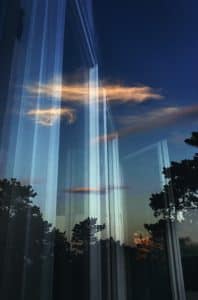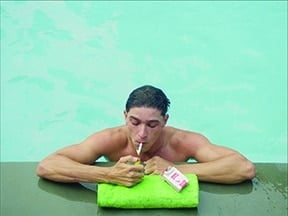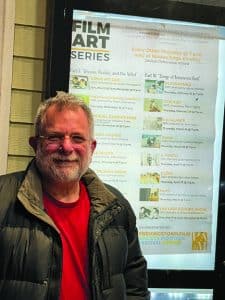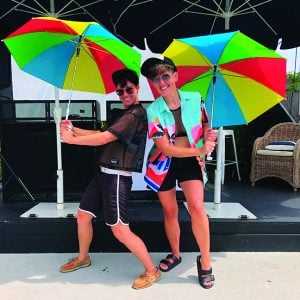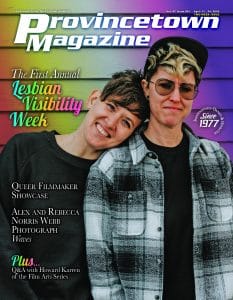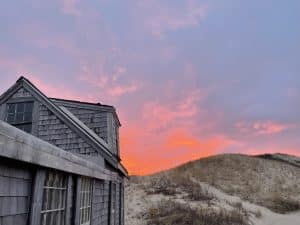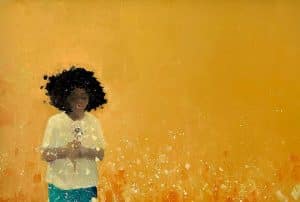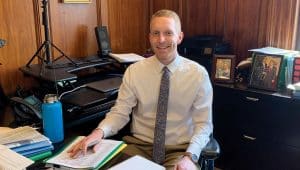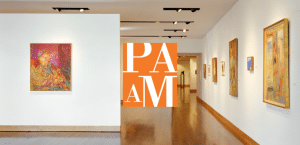by Rebecca M. Alvin
Leda Muhana has a powerful motivation for developing an audience for modern dance on Cape Cod: she’s doing what she wants to do. The retired Brazilian dancer, choreographer, and professor looks at retirement in a specific way; she’s not going to stop working, because she’s an artist. And artists never stop doing what they were born to do.
Muhana moved to Cape Cod in 2015, although she’d been here in the past while studying at Smith College. She received her master’s degree in dance kinesiology from University of Utah and her Ed.D. in the teaching of choreography from Temple University. In her career, she spent 18 years directing and performing in the Tran Chan Dance Company, presenting work throughout Europe, South America, and North America, before becoming a full professor of dance at the Dance School of the Federal University of Bahia in her native Brazil, ultimately becoming the head of that school for four years. When she retired to Brewster, she recalls, “I said, ‘I am doing exactly what I want from now on. I don’t want meetings, those boring meetings at institutions.’ So I cut out everything I don’t like. What do I like? I like creating. I like choreographing. I like collaborating—I love to have a group of people thinking together— this is what we want to discuss, this is what we want to think of or raise reflection upon, but how can we do that in a way that is aesthetic, that is current, that is real?”
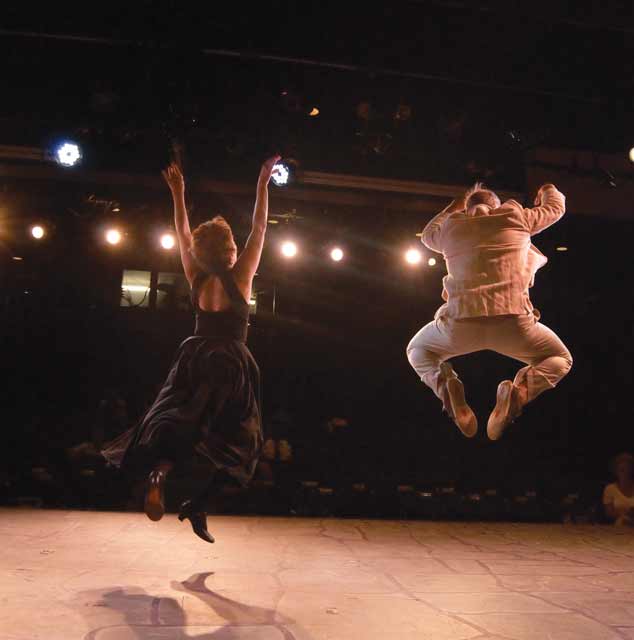
That desire to continue creating without the restraints of a university led her and her husband David Iannitelli, who is also a dancer, choreographer, and professor, to start a new organization for the express purpose of stimulating modern dance on Cape Cod, a place with no established presence in the dance world. Although there are a couple of dance festivals on the Outer Cape and, of course, numerous dance-school recitals, there really are no modern dance or dance theater troupes performing full seasons on the Cape the way there are theater companies, for example. And certainly postmodern dance is not commonly seen here. But Muhana and Iannitelli, through their Movmiento Project, a collection of contemporary pieces choreographed and presented to audiences on Cape Cod, including programs at Wellfleet Preservation Hall each summer, and one called Paradox that just closed at the Cape Cod Theatre Company (formerly Harwich Junior Theatre) in Harwich, are out to change our understanding of what dance on Cape Cod can be.
“Sometimes I feel that dancers are on stage here, they have that molded shape. ‘I’m on stage, this is my body.’ And that’s one thing I was telling the dancers at the last performance. I said, ‘Please walk on stage the way you walk in your house, going from your bedroom to the living room, because that’s the whole movement of postmodern dance, when we broke with modern dance, was approximating the art of life,” she says. “After world wars, after what’s going on in the world right now, you’ve got to get real. So that’s the aesthetics I kind of exercise every day: if I make this movement, how would that reach a person? What possible meanings, what are possible feelings of that, you know?… How this resonates my experience. When do I have that kind of feeling when I do that? So, trying to really have the resonances in my life and in the others I collaborate with and see how that goes. That’s how we work.”
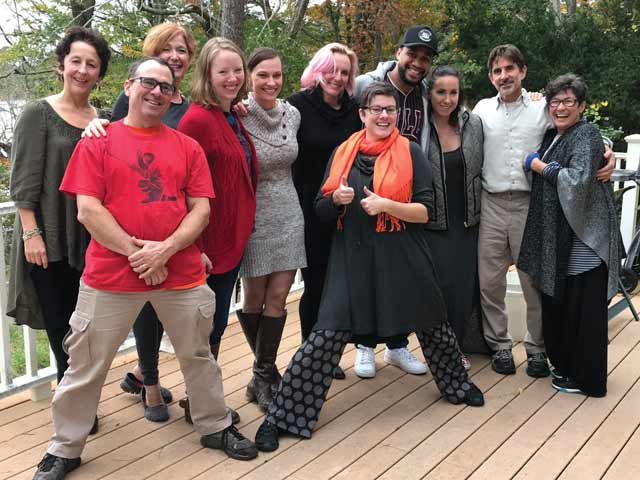
Next up, Muhana is leading a workshop dealing with mind-body connection on Saturday as part of Christie Hardwick’s Provincetown Inspiration Weekend, which is described by the organizers as “an immersive, connected experience using music, lyric, and spoken word for the purpose of personal and spiritual development.” Muhana says she felt her experiences as a dance teacher and as a dancer connected with the themes of the event, and she felt she had something to contribute. “When [Christie] said that it was about well-being, it was inspirational, you know, that it would be positive and that people would get out of it with another attitude for life, I think there’s nothing better than a body experience to feel that. That’s my experience anyway. I know it is like all of the arts,…but I think the body, it’s not something that you just think, ‘Now I’m going to live in my body.’ You have to exercise that,” she says. “So many times we violate or not even allow ourselves to listen to how we’re feeling because you can’t afford that, you have compromises. So we live in a culture [where we are] frequently neglecting the body’s signs because we have compromises and we have things to do and errands, so, to have moments that you give the body the main voice, I think it’s not only therapeutic, it’s not trivial, it’s essential.”
While Muhana says the workshop will emphasize a connection between breathing and movement, she distinguishes it from yoga, something she has only casually explored and feels is quite specific and distinct from the kind of creative movement she is working with, which uses guided improvisations.
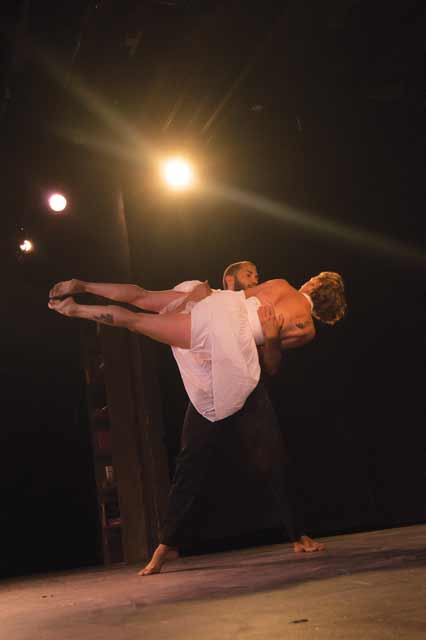
She brings to the program her dance kinesiology background in which, using a framework she says was developed by dance kinesiologist Valerie Hunt that delineates four qualities of movement derived from what happens physiologically in the body. The four qualities (sustain, undulate, burst, and restrain) may seem a bit esoteric and hard to relate to for non-dancers. Working with a student in Brazil, Muhana came up with a reinterpretation of these qualities that lines up with the four elements in nature, something here on the Cape we may all find more relatable. “So we have the sustain is air, undulation is water, the burst is fire, and the restrain is earth,” she explains.
The mind-body connection is a well-documented phenomenon. The impact of psychological stress on the physical health of a person, the physical symptoms that arise when someone suffers from depression or anxiety, these are all fairly uncontroversial aspects that we know exist. But on a more conceptual level, there may also be connections between how we breathe, how we move, and how we ultimately behave in the world around us. In this way, you could say Muhana’s work takes on a political significance. The act of creating is, in and of itself, a force to reckon with. It is not a passive acceptance of things, but rather a direct action bringing something to the world that was within you. As Muhana puts it, “The air being what is out coming in. So the world in you and you in the world. So that kind of exchange, the breathing brings that image very clearly: you as channeling this in this environment. You get what is there and you put yourself out, as well.”
All of this comes from Muhana’s deeply felt recognition that in order to be who she is in the world, she must allow herself to do that which is personally meaningful. She tells the story of a dancer she is working with who has recently become a father, is working four jobs in Brazil, and says he has no time to do what he needs to do as a dancer. She told him that he must find the time because it is important. It is not something that can be pushed aside, especially because it is his body’s need. “We’re not used to listen[ing] to our bodies, you know, and even linguistically, we talk about our bodies as something else, not us,” she laughs. “We’re here and the body’s over there, you know. I said, ‘You’ve got to listen from within, from inside, you’ve got to be in there, you’ve got to feel it inside, feel its impulses, its energy, its timing, its desire for space. You know, we have to give ourselves that. He’s a dancer, but I would say that to anyone in the world.”
Leda Muhana will lead a workshop on the mind/body connection as part of Provincetown Inspiration Weekend on Saturday, October 6, 10 a.m. – 12 p.m. at Fishermen Hall, 12 Winslow St. There are several ticket package options that include this event. For more information visit inspirationgatherings.org.

